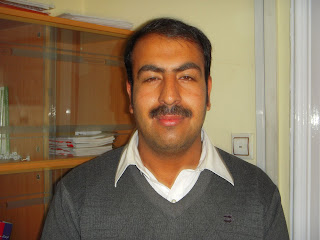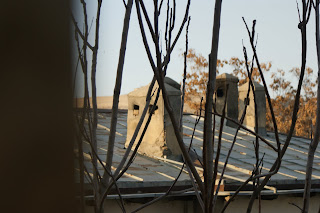February 6, 2009 Living in Kabul has been rich beyond imagination. I often have trouble putting words to paper because so many sights, sounds, and tastes compete for air. Of the many things I love about this city, I offer the following which I will carry with me.
The greeting that meets me every morning when Shah Mahmood drives me to work: Roz-e khush, “have a good day.” Literally, “have a rosy day.”
Moroyhar kanar, or chAklEtA, hard butterscotch candies which the kitchen staff set out in small glass bowls every morning and place in each office in the compound where I work. The hard shell of the candy melts and gives way to a creamy caramel.
Abdul Qadeer “Istalfi” Carpet and Handcraft Store on
Chicken Street, my favorite shop in Kabul. Abdul Qadeer sells carpets,
chapan (also known as the “Karzai coat,” a mid-calf length purple and green silk jacket worn as a cape with the sleeves hanging free),
pakol (a round, flat wool hat worn by men), gorgeous painted furniture made by Afghan refugees in Pakistan, silk and cotton tapestries. The shop is a maze of separate rooms; as soon as you think you have seen the last offering, there is another small room behind the next decorative curtain. Today I went to Abdul Qadeer’s shop with my friend, Tom. Abdul was willing to bargain with Tom because Tom came with
mAdar, or “Mother.” (That's me!) I enjoy an elevated status in Afghanistan due to my tender age!
 Nan
Nan, the best bread I have ever eaten. A loaf of Nan, a two foot long flat bread, can be bought at one of the dozens of street bakeries that dot Kabul’s commercial and residential neighborhoods. Indeed, Nan bakeries may be the Starbuck’s of Kabul, that is how close together they are found. Nan is baked on a blazing charcoal grill and sold hot. Breakfast, lunch, dinner, I never get tired of it.
The BGs as our bodyguards are known affectionately watch over all of us who live in the Guest House and work on the Rule of Law Project 24/7. There are 8 BGs, all young Afghan men dressed in natty royal blue blazers and packing heat! My friend and BG, Farid, i s a born leader. Within days of my meeting him, Farid was offered a job as a security supervisor and left us. The BGs ride in the car with us to and from work and home and wherever we go on our day off, always sitting in the front passenger seat. All those years that my children competed for the front seat of the car by seeing who could shout “Shotgun” first, and now I know why. The BGs are no older than my two children. It is their job to get out of the car first, assess the setting, and then give us the nod to get out. The mAdar in me wants to take care of them. It hardly seems right that they should put themselves at risk when they are so young and have their long lives ahead of them.
s a born leader. Within days of my meeting him, Farid was offered a job as a security supervisor and left us. The BGs ride in the car with us to and from work and home and wherever we go on our day off, always sitting in the front passenger seat. All those years that my children competed for the front seat of the car by seeing who could shout “Shotgun” first, and now I know why. The BGs are no older than my two children. It is their job to get out of the car first, assess the setting, and then give us the nod to get out. The mAdar in me wants to take care of them. It hardly seems right that they should put themselves at risk when they are so young and have their long lives ahead of them.
 The calico cat lives at our office. I heard her before I met her, basking in the sun on the terrace of the office, mewing at the top of her lungs as the lunch hour approached. No fool, this Afghan peshak, she has worked her charms on me and all but a handful of my colleagues as she makes her way from office to office to lounge on a comfortable chair, announce her hunger, or nuzzle up against a friendly ankle. I wish I could bring her home with me.
The calico cat lives at our office. I heard her before I met her, basking in the sun on the terrace of the office, mewing at the top of her lungs as the lunch hour approached. No fool, this Afghan peshak, she has worked her charms on me and all but a handful of my colleagues as she makes her way from office to office to lounge on a comfortable chair, announce her hunger, or nuzzle up against a friendly ankle. I wish I could bring her home with me.
Meena, Salima, Modera, Kamila, Modera, and Razia, my young Afghan colleagues. Salima translates legal publications from Dari to English. She learned English as a child and in her free time teaches young Afghan girls English and math because, as she told me, she was lucky to have a family that encouraged her to get an education and many Afghan gi rls are not so lucky. Razia has her law degree and also works as a translator. Parwana (her name means “butterfly” in English), Kamila, and Modera are Cleaners at my office. Meena is a Human Resources Clerk. Not a day passes that I am not asked, “How is your daughter? How is your son?” Meena often greets me with “Hello, Mum, how are you? Your eyes are beautiful today.” Salima and I share an office. When I come in on a morning, she asks “How was your evening?” When we part at 4:30 PM, I say, “Have a nice evening,” to which she responds, “I wish you the same.”
rls are not so lucky. Razia has her law degree and also works as a translator. Parwana (her name means “butterfly” in English), Kamila, and Modera are Cleaners at my office. Meena is a Human Resources Clerk. Not a day passes that I am not asked, “How is your daughter? How is your son?” Meena often greets me with “Hello, Mum, how are you? Your eyes are beautiful today.” Salima and I share an office. When I come in on a morning, she asks “How was your evening?” When we part at 4:30 PM, I say, “Have a nice evening,” to which she responds, “I wish you the same.”
I have become friends with a group of women law professors who are in Kabul studying Legal English in hopes of becoming sufficiently fluent to earn fellowships to study in the United States. Three times a week, I go to Kabul’s Safi Landmark Hotel where
Anargul Mansouri, Nadia Noorzi, Noor Jahan Xousufuzai, Sekba, Fairida Qadiri, and
Nadia Alkan are staying and we speak in English. I have learned from them what it was like to live under the Taliban when they were young girls. They were not allowed to attend school, and could not leave their homes. Nadia Alkan described those lost years as a time when her mind lay fallow but the seeds for her career in law germinated. Today she teaches on both the Law and Sharia Faculties at Kabul University. Three of these women are married to husbands selected by their parents. Until they married, they lived at home with parents, grandparents, in-laws, nieces, and nephews. As they became comfortable with me, Anargul asked with a twinkle in her eye, “Can we ask you personal question?” “Of course,” I said. “Did you have boyfriends before you married?” I owned up to one or two boyfriends and explained that it is our custom in the United States. They explained that boyfriends and dating are not a possibility in Afghan culture, and that is fine with them.

Dovecotes dot the rooftops of many homes in Kabul. On my first morning here, I awoke early to the call for prayer which sings across the city five times a day, starting at sunrise. Listening carefully, I discerned a competing sound. Cooing. I got out of bed and opened the curtains to see where the noise came from. There they were at eye level, cooing to their hearts’ content, a flock of doves issuing their own call to worship from their lofty temples atop the house next door.
 Nan, the best bread I have ever eaten. A loaf of Nan, a two foot long flat bread, can be bought at one of the dozens of street bakeries that dot Kabul’s commercial and residential neighborhoods. Indeed, Nan bakeries may be the Starbuck’s of Kabul, that is how close together they are found. Nan is baked on a blazing charcoal grill and sold hot. Breakfast, lunch, dinner, I never get tired of it.
Nan, the best bread I have ever eaten. A loaf of Nan, a two foot long flat bread, can be bought at one of the dozens of street bakeries that dot Kabul’s commercial and residential neighborhoods. Indeed, Nan bakeries may be the Starbuck’s of Kabul, that is how close together they are found. Nan is baked on a blazing charcoal grill and sold hot. Breakfast, lunch, dinner, I never get tired of it.



1 comment:
I love this description of these competing...or coexisting...calls
Post a Comment